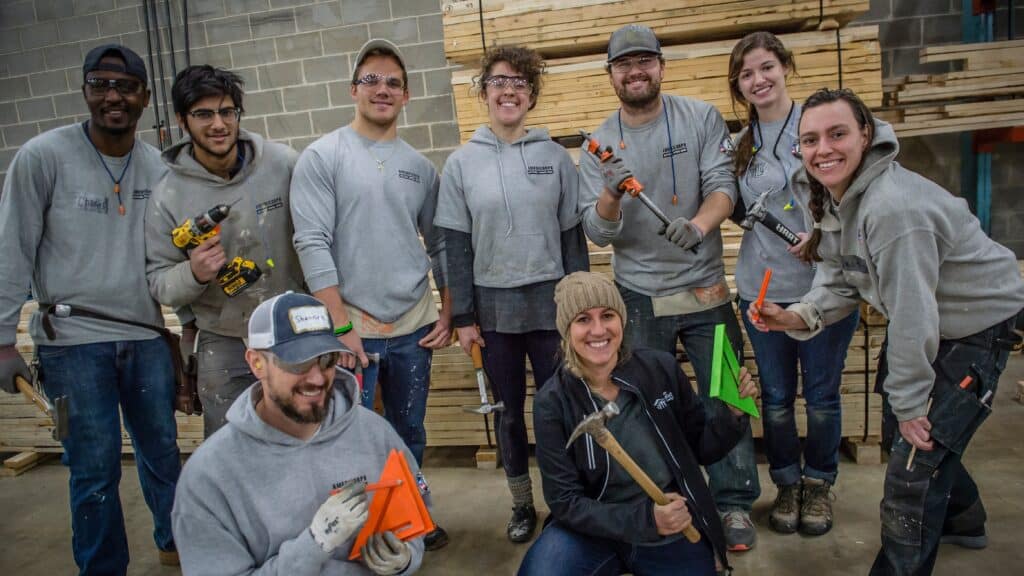In John F. Kennedy’s Inaugural Address on January 20, 1961, the President called on all Americans to commit themselves to service and sacrifice: “And so, my fellow Americans: ask not what your country can do for you – ask what you can do for your country.” Kennedy believed that democracy thrives only when citizens contribute their talents to the common good and that it is up to leaders to inspire citizens to acts of sacrifice. This call to service resonated with a rising generation of Americans looking for direction and purpose in the 60s and early 70s in the midst of the Vietnam War, civil rights protests, the Cuban Missile Crisis, the assassination of both the President and his brother Robert Kennedy and Martin Luther King, and the Kent State shootings, among other domestic and world events.
Over the past half-century, U.S. public policy has sought to increase the number of Americans engaged in service activities and volunteering. President Kennedy established the Peace Corps as a way to provide American assistance to developing nations, President Lyndon B. Johnson created VISTA (Volunteers in Service to America) in 1964 to assist in the War on Poverty, President Jimmy Carter created FEMA in 1979 to help people before, during, and after disasters, President Bill Clinton created AmeriCorps in 1993 with a goal of “helping others and meeting critical needs in the community,” and President George W. Bush created the USA Freedom Corps in 2002 “as a way to connect Americans with more opportunities to serve their country and to foster a culture of citizenship, responsibility, and service.” These federally-funded programs have given millions of Americans in the decades since Kennedy’s inspirational speech, important and constructive ways to give service to their country, whether here or abroad.
Although almost all the recent U.S. presidents have encouraged Americans to volunteer and have started programs aimed at increasing volunteering, President Barack Obama accelerated this trend when he urged Congress to pass the Serve America Act, legislation that would dramatically increase the size and scope of national policies and institutions supporting service and volunteerism. The renamed Edward M. Kennedy Serve America Act was passed into law in 2009, introducing five new service corps which address the needs of low-income communities: a Clean Energy Corps to encourage energy efficiency and conservation; an Education Corps to help increase student engagement, achievement and graduation; a Healthy Futures Corps to improve health care access; a Veterans Service Corps to enhance services for veterans; and an Opportunity Corps. The bill also expanded the number of volunteers nationwide from 75,000 to 250,000, and expanded the list of AmeriCorps programs.
We have long recognized the service of those in the military and law enforcement, and the work of such non-profit service and humanitarian organizations as The Salvation Army, American Red Cross, Meals on Wheels, and Habitat For Humanity, but It has taken the events of the 21st century – from 9/11 to COVID – for our nation to also recognize the “service” role of those who we now refer to as frontline workers and first responders: doctors and nurses, EMS workers, firefighters, grocery store workers, food service providers,…those who ran forward so others could run away, who braved the elements of natural disasters to save the lives of others, who kept hot food coming to feed weary workers, who made sure no neighbor was isolated or wanting, who separated themselves from their loved ones to be there for others… Those that step forward in times of need to help others elevate acts of compassion, concern, selflessness, and commitment to the level of national service.
Since the outbreak of COVID-19, numerous service institutions and volunteer organizations have received additional federal funding, grants, and private donations to expand their programs and services, and increase their number of volunteers in the national interest of the country. And hundreds of thousands have stepped up to the task at a time when the need has never been greater or the risks, higher.
Service – to our country, community, and to others – has a long tradition that dates back to the founding of our great nation, when being a good citizen and Christian neighbor meant doing what you could in service to others. This included enlisting in the local militia to defend and protect as needed, volunteering for “night watch” to police and protect the community’s moral integrity against prostitutes and gamblers, taking a place in the bucket brigade to put out a fire when the “throw out your buckets” cry was sounded, and supporting a neighbor in need with food, shelter, and clothing.
Individual acts of heroism and citizenship, compassion and duty, volunteerism and sacrifice, are the heart and soul of our country and why there is so much interest in service collectibles. Collections that honor and showcase the history of service organizations help preserve what is best in us as a country, and will hopefully inspire future generations to write their own service stories into this national legacy.
As Martin Luther King Jr. said, “Everyone can be great, because everyone can serve.”





Related posts: